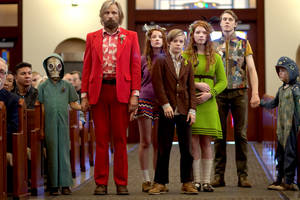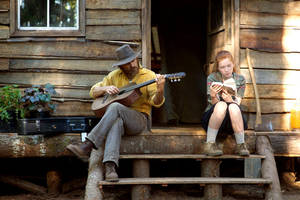Captain Fantastic (Ross, 2016) imagines an intellectual experiment in child-rearing. In it, Ben Cash (Viggo Mortensen) and his wife, Leslie (Trin Miller), have decided to raise their spawn in a remote area of the Pacific Northwest. We enter the story after she, the victim of episodes of paranoid schizophrenia, kills herself in a Texas hospital, leaving Ben to care for their six children on his own. Leslie’s treatment has been paid for by her wealthy parents, who had considered Ben to blame for Leslie’s condition and who had demanded that he stay away from their daughter. When word reaches Ben that Leslie’s parents plan on ignoring Leslie’s Buddhist wishes by giving her a Christian funeral, he bolts into action and decides that he and the kids will attend. After a short discussion, Ben and the kids jump on their bus “Steve” and begin the journey south. The majority of the film concerns the culture clash between the sheltered, yet highly educated and cultured kids, and contemporary society.
As the Cash family is cut off from the world, Ben is forced to go to a nearby town to get updates on Leslie. It is here, alone in a bar, that Ben learns of the death of his wife. Ben reacts to the information in a most minute way. His eyes search, then clench as he hangs up the phone. Silence, as his eyes catch something outside of our view. The camera holds, then slowly pans in the direction of his gaze, as soft melodious music rises, interspersed with sounds like waves. Then an instant cut to Ben being pummelled by an immense amount of water. Here Ben takes on the image of a comet, not burning up in the atmosphere, but dragged down by heavy cold waters. He attempts to stand, succeeds for a moment, becoming obscured in the whiteness of the splash, before succumbing. The camera jumps back to a wide shot of Ben as an extension of the rock he is sitting on, head down as he endures the blunt force of the eternally flowing waters. An apt and beautiful image of grief and loss.
The life that Ben and Leslie constructed in the forest is a beautiful vision, including all the staples of an alternative lifestyle. They grow their own greens, and eat only what meat they are able to hunt with knife and bow. The family resembles a tribal village, complete with unique rituals and fireside dancing. Their life is not, however, limited to the physical world; the children enjoy an almost uninhibited access to books (an early scene involves a teen explaining the plot of Lolita), but daily life also contains strenuous physical training. All of this is overseen by the intellectual giant and at times tyrant that is — their father. While he emphatically refuses to lie to his children and cares immensely about their wellbeing, he is not forgiving or understanding of physical or intellectual weakness. His is an extreme variety of a modern helicopter parent, who wants to push his offspring to greatness not by removing obstacles from their path, but rather by continuously adding new challenges. What you end up with is something that is beautiful, in theory, but perilous in reality.
Really, what Ben and Leslie tried to do is frighteningly close to brainwashing and indoctrination, and it is inevitable to see fragments of systems that Ben pretends to abhor in the way he treats his children. The kids talk of missions like a ragtag group of revolutionaries, all seemingly unaware that they are not as indestructible in the real world as they feel. While speaking five languages is impressive and admirable, it does not, in the end, equate to tangible power. Still, the film makes a convincing argument for the power of homeschooling with all the knowledge that the children seem to hold; but this is an easy trick for a filmmaker to perform. Even so, the fantasy of youths so encapsulated by lore, knowledge, language, and history is enrapturing. This idealistic dream of children born to be “kings and queens of philosophy” is not cheaply bought, however. Much must be sacrificed in the kids’ lives, play and social skills take a backseat to training and debate in their world, and when they come into contact with the realities of society, some of the children begin to see themselves as freaks. While outstanding students and philosophers at a very young age, they are immensely different from everyone else, and only then do they begin to feel the weight of their previous isolation.
The film continues to grapple with the dilemmas and conflicts of Ben and Leslie’s choice of parenting for the remainder of its running time, and thus is very light on conflict. To enjoy Captain Fantastic, the viewer must be ready to take a journey in philosophy and discourse rather than through a typical movie structure. It can be refreshing, but parts of the plot seem inconsequential when whole storylines are left unfinished and unfulfilled for the promise of a happy ending. All its faults aside, I feel Captain Fantastic does a great job of challenging how we perceive education, ideology, philosophy, and childcare. It is a movie that does not end when you leave the cinema, but one that requires meditation and thought weeks afterward.
Author Biography
Frederik Hartmann is an undergraduate English student at Aarhus University, Denmark. While an inhabitant of the happiest country on Earth, he follows his passions into many other worlds and realms via literature, films, and games.
Film Details
Captain Fantastic (2016)
USA
Director Matt Ross
Runtime 118 minutes









































